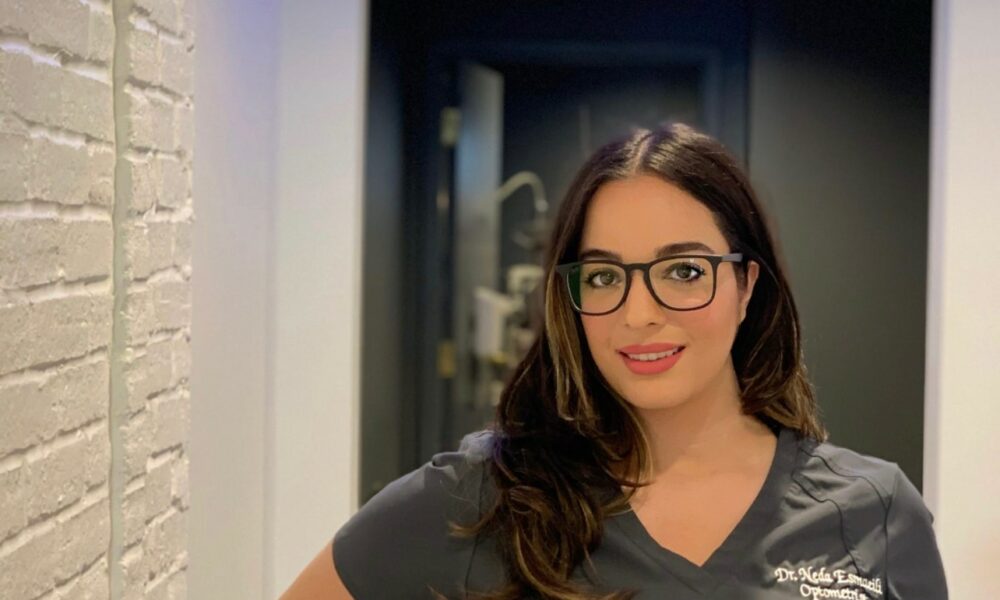

Today we’d like to introduce you to Dr. Neda Esmaeili.
Hi Dr. Esmaeili, can you start by introducing yourself? We’d love to learn more about how you got to where you are today?
When I was a child, I used to play teacher and doctor with my little sister. And I started to think about the type of doctor I’d like to be when I grow up. I naively thought to myself, “I think eyes are beautiful, I want to be an eye doctor.” As much as I’d like to say that was that, it wouldn’t be entirely truthful. In reality, once I was in college at the University of Houston, I started to question my career path because I was struggling in my science courses. I didn’t naturally gravitate or understand science like some of the other chemistry or biology majors. So I decided to explore optometry more. I worked at an optometry clinic for a summer, and I shadowed an optometrist for a while. I researched into the career on my own time.
After putting in the work, I realized that optometry is a great career that allows you to have a work-life balance. So once I made the decision, I accepted that the path towards my optometry doctorate degree would be hard and tried my very best to stay on course. I graduated from the University of the Incarnate Word Rosenberg School of Optometry in 2015 and have been loving it since. In June of 2020, during the height of the pandemic, I started my own small optometry clinic. This current journey certainly hasn’t been without its struggles, but I’m really happy with my current work setup. I get to see and treat patients on my own terms now and that is honestly the best feeling. I love being accessible to my patients.
I’m sure you wouldn’t say it’s been obstacle free, but so far would you say the journey have been a fairly smooth road?
I would say no, it certainly wasn’t a smooth road. I was born and raised in Houston and went to U of H for undergrad. I’m from a conservative and tight-knit family. I know going to grad school in San Antonio, which is only 3 hours away from Houston, doesn’t seem too far but for me moving away was very lonely at first. It caused me to struggle my first year in optometry school with the course load because I was always driving back to Houston on the weekends to see my family and my boyfriend.
After that initial shock, I adjusted and things got better. In general, though, grad school was a tricky balancing act for me. I started dating my now-husband before going to grad school, and we got married while I was in my program. We didn’t even live together the first year of our marriage because I was away on externships. In retrospect, though, I’m really glad I went to UIW because I got a fantastic education from their optometry program. Also, being in a long-distance relationship really put things in perspective for me. It made me realize what a great person my husband is; it sort of solidified our relationship. Sometimes, distance really does make the heart grow fonder.
Can you tell our readers more about what you do and what you think sets you apart from others?
My practice is an optometry clinic, where we mostly specialize in primary eye care. We see patients for their glasses and contacts. We also monitor diseases such as dry eyes, diabetic retinopathy, macular degeneration, glaucoma, etc. If a patient needs further care, we work with other specialists to find them the best doctor possible.
Also, our clinic is very tech-friendly and we are proud of how easily accessible we are. You can call, text, or email us to reach us or simply book online via our website. Our demographic is mostly young professionals who are busy, although we see a wide range of patients (ages 5+). We understand you may not be able to give us a call in the middle of your workday. So many of them text or email us to schedule an appointment or to ask general questions. We offer the best eye care & in a convenient way to fit your lifestyle.
Where do you see things going in the next 5-10 years?
I think optometry & healthcare as a whole will be moving towards more tech-based medicine and telemedicine when warranted or needed. There will always be in-person exams, though, sometimes that is the only way to diagnose or treat a patient. A trend I’d like to personally see is better insurance plans that put the patient first. Or universal healthcare. I don’t support health insurance companies being publicly traded & for-profit. Health should never put profit before a patient’s needs.
Contact Info:
- Email: info@eivaeyecare.com
- Website: www.eivaeyecare.com
- Instagram: www.instagram.com/eivaeyecare
- Facebook: www.facebook.com/eivaeyecare






 Image Credits
Image Credits
Sobhan Alitavoli










